- Home
- John Bellairs
The Bell, the Book, and the Spellbinder Page 7
The Bell, the Book, and the Spellbinder Read online
Page 7
Fergie felt goose bumps rising on his arms and on the back of his neck. His teeth chattered. For a second he thought he was going to faint dead away, but then the figure simply faded, dissolving like a patch of mist in a breeze. It was gone.
Fergie switched on his light, moved a chair to the closet, and got the book down. He opened it and frantically tried to tear out the pages. Although the paper felt thin and fragile, it was tougher than any real paper could ever be. Fergie could not make even the smallest rip. He bit his lip, and then made a decision. He opened his bedroom door and listened. The house was silent.
Barefoot, Fergie tiptoed downstairs, into the kitchen, and then down into the cellar. The furnace was down here. Most places in Duston Heights had replaced the old coal-burning furnaces with oil-burning ones, but the Ferguson house still had an old coal burner. No fire burned there now, but a pile of dry kindling waited in a box on the floor. Fergie opened the iron door—it screeched on its hinges, making him flinch—and then tossed sticks of kindling into the furnace. He got a box of matches from a shelf and lit some small splinters in the pile. Soon the sticks caught fire, snapping and crackling as they began to blaze. As soon as the yellow flames were leaping up, Fergie carefully tossed the book right on the fire. He shut the fire door and hurried back upstairs.
Fergie closed his bedroom door behind him, locked it, and leaned on it. He felt like crying. He had given up great power. There were so many wishes left to make.
And yet he felt good too—he knew that somehow the book had been gaining control over him, making him its slave. Well, that was over at last.
With a sigh, Fergie clicked off the light and climbed into bed. But when he lay back, his head touched something flat and hard. He leaped out of bed, turned on the light again, and stared at his pillow. The book lay there, unscorched, safe and sound. And it was different. The black cloth looked darker, shinier, newer. The red letters of the title almost glowed with a baleful light of their own. Shuddering, Fergie stepped closer.
The book flopped open. Fergie blinked, and this time tears did come to his eyes. On the open pages was a stern warning. Fergie felt as if he were falling into a yawning, dark, bottomless pit. It was too late to save his friends now—too late to save himself.
The warning in the book was stark and plain:
If you try that again, you will die most horribly.
CHAPTER NINE
Right after church the next day, Johnny showed up at Fergie's house. Mrs. Ferguson smiled and said, "I don't think Byron's feeling very well today. He said he had a bad headache, so we let him sleep in. But maybe he's better now. You can go up and see if you want, Johnny. But watch out! He can be a bear in the mornings."
Worried as he was about his friend, Johnny couldn't help grinning. That was the old Fergie, all right—the worst waker-upper in the world. At Boy Scout camp it took everything short of a stick of dynamite to get him up in the early morning, and then he was grumpy and sore as a boil until he'd had a big breakfast. At least Johnny could be grateful that some things hadn't changed.
Johnny started up the stairs slowly, thinking about his mission. He, Sarah, and the professor had returned to Duston Heights late the previous night. On the drive back, Professor Childermass had suggested that Johnny try to learn exactly how and where Fergie had come across the name Jarmyn Thanatos. "Something dire and pretty horrible is going on here," muttered the professor. "But until we know exactly what we're up against and how Thanatos has got at Byron, we haven't anything to fight."
"Professor," Johnny had asked in a small voice, "do you think maybe the man who's been paying the taxes on that place really is the same one who tricked your father?"
"Fiddlesticks," said the professor with a snort. "Also hogwash, applesauce, and horsefeathers! We know that an orphan boy called Adam Nemo changed his name to Jarmyn Thanatos a little more than sixty years ago. Obviously, that boy has grown up to be the modern Jarmyn Thanatos, now close to eighty years old. My grandfather used to tell me that you can't beat Annie Domini, John. Despite appearances, I still believe he was right."
"Annie Domini?" asked Sarah, sounding puzzled.
"My grandfather's little joke," replied the professor. "Anno Domini, better known as Father Time. No, John, what you have to do, and as soon as possible, is to see Byron and discover . . ."
And so here Johnny was, hesitating outside his friend's bedroom door. He raised his fist and gave a timid knock. From inside came a muffled voice: "Whazzit? Goway. Leamme lone."
"Hey, Fergie?" called Johnny. "It's me. Open up."
No answer. Johnny plodded downstairs. The smell of a roasted chicken met him, and Mrs. Ferguson stepped out into the hall from the kitchen. "Still asleep?" she asked. When Johnny nodded, she smiled. "Well, it's high time he got his bones out of bed. Stay for lunch, Johnny. I think Fergie's been by himself too much lately. You two haven't had a quarrel, have you?"
"No, Mrs. Ferguson," said Johnny truthfully. "It's just that Fergie's been kind of moody lately. I thought maybe something had happened at school or—" he broke off, too embarrassed to add the words "at home."
"I hope he isn't running with a bad crowd," said Mrs. Ferguson. She sighed. "You wash up. Lunch is almost ready, and I'll get Byron out of bed if I have to use a block and tackle."
Johnny washed his hands and went back downstairs, passing Mrs. Ferguson on the steps. She banged on Fergie's door until Fergie yelled, "Okay, okay, I'm up!" in a disgruntled voice.
"You've missed breakfast already. Now wash up, get dressed, and don't miss lunch!" snapped his mother.
At the foot of the stairs was a coat stand with a couple of raincoats hanging on it. Johnny slipped behind this and peered up the stairs. Mrs. Ferguson came down and vanished in the direction of the kitchen. Then Fergie's door opened and Fergie came stomping out. He was wearing green and white striped pajamas and carrying a pair of jeans and a white T-shirt wadded up under his arm. He yawned as he opened the bathroom door and went inside. A second later the shower began to run. Johnny tiptoed up the stairs and into Fergie's room.
He paused and looked around. Nothing had changed. Fergie's bed was a tangle of sheets and blankets, as if he had been wrestling with nightmares. His friend's desk was in its usual clutter of schoolbooks, library books, and miscellaneous junk. A baseball with a split cover rested next to Fergie's switchblade comb. The softball trophy that Fergie had won a few seasons back stood crowned with a golden plastic batter about to take a good hard swing. But the bat had broken off, and the softball player just looked a little stupid holding the stump. Next to the trophy was an Aurora model kit of the P-40 Flying Tiger airplane.
Johnny frowned. He remembered when Fergie had bought that kit, nearly six weeks earlier. Other finished models stood on clear plastic stands or dangled on strings from the ceiling: a B-17, a B-24, a German Stuka, a Japanese Zero, a P-47, and a blue U.S. Navy Corsair. Fergie was good at models, and he put them together within a day or two of buying them. But the P-40 was only half finished. The fuselage was wingless, and Fergie hadn't even started the paint job or applied the decals. A thin coating of dust covered the olive-drab plastic. Fergie hadn't touched the model for weeks.
But Johnny did not have time to worry about that. He felt like a sneak, but he had promised the professor to check for any evidence of Fergie's connection with the mysterious Mr. Thanatos. He quickly looked around, but he had no idea of what he was searching for.
Then he remembered Fergie's secret hiding place. Was it right to pry into something as private as that? Johnny decided he had no choice. He grabbed the chair and climbed up on it. He thrust his arm inside the closet and felt around. There was something in the cardboard compartment, all right. Johnny grabbed hold of it with his forefinger and thumb, fumbled it, and then got a better grip. He pulled out the book and stared down at it, feeling his flesh creep.
Part of the mystery was solved. There was the name he was looking for, right on the cover.
Suddenly, Johnny realized th
e sound of the shower had stopped some moments before. What if Fergie came in and caught him? He heard the bathroom door open.
With frantic haste, Johnny replaced the book, hopped down, and moved the chair over to the desk—just as Fergie opened his bedroom door. He froze with his hand on the knob, staring at Johnny.
"Hi," said Johnny, trying to make his voice light. He pretended to be leaning on the back of the chair. "So you're still putting the Flying Tiger together, huh?"
"Yeah." Fergie went to a drawer, took out a pair of socks, and tugged them on. Then he put on his sneakers. "Hey," he said suddenly, "is your dad still stationed at that base in Colorado?"
"Yeah," said Johnny. "But he may be coming home for a couple of weeks this—"
"You know what, John baby?" asked Fergie with a kind of rigid grin. "I think it would be great if you went out West to visit him. Ever thought about that?"
Johnny felt gooseflesh rising on his arms. Something was badly wrong. Fergie looked like himself, though thinner, with dark circles under his eyes, and he was trying to talk like himself, but the tone was false. "Uh," said Johnny, "I don't know if the Air Force would let me. He's in the Strategic Air Command, and his work's classified—"
"Go," urged Fergie. "Man, it would be so great, wouldn't it? You could see the Rockies, and maybe your dad would even take you skiing or something, and—"
"Come to lunch!" called Mrs. Ferguson from downstairs.
"Yeah, it'd be great," muttered Johnny, turning to go.
Fergie grabbed his arm above the elbow and held him back. "John baby, listen to me. I think you'd better go and visit your dad right now. This week. Or somethin' might happen—somethin' awful."
"Hey, let go," said Johnny. "You're hurting my arm."
"Come on—the jailer says soup's on," muttered Fergie bitterly. He pushed past Johnny and led the way downstairs.
Johnny hardly ate a bite. This meal was very different from the breakfast he had eaten with the Fergusons four or five weeks before. Mr. and Mrs. Ferguson hardly spoke to each other except to ask for the salt or the bread. Fergie stared at his plate and pushed his chicken and mashed potatoes around with his fork. Johnny felt like an intruder, not a guest. As soon as he decently could, he got up and said, "Well, I guess I'd better be getting home. Thank you for having me."
Mrs. Ferguson gave him a tight smile, but her eyes looked as if she were about to burst into tears.
Fergie walked outside with Johnny. "Think over what I suggested," he said. "I mean, your teachers would probably let you go an' all. It would be, like, an educational trip."
"Yeah," said Johnny. He got on his bike but didn't push off. He stood there, leaning on his left leg and staring at his friend. "Fergie, what's wrong with you? I mean, really. I know it sounds like kid stuff now, but up at Camp Chocorua we said we'd always be blood brothers and—"
Fergie's face turned red. "I don't have any brothers!" he snapped. "And neither do you!"
"Hey, take it easy—"
Fergie's eyes narrowed. "Say," he muttered in a low voice, "what th' heck were you doin' in my room, anyway?"
Johnny swallowed, but he knew his own face was getting red. It felt hot. "I was just waiting for you," he said. "Your mom said you—"
"You were spyin' on me!" snapped Fergie. He balled his fists. "Dixon, for two cents I'd teach you a lesson or three. Get out of here if you know what's good for you!"
"Fergie, calm down. I didn't—"
Fergie kicked the rear tire of Johnny's bike so hard that Johnny almost lost his balance and toppled over. "Johnny, get out of here!" he screamed. "I don't wanna do anything, but he's gonna make me!" His face twitched, and his expression became a mask of fury. "I hate spies! Go on, get out of here! You've got somethin' comin' to you, Dixon!" Fergie's voice suddenly changed. He sounded British as he yelled, "Get away, sir! I advise you to flee while you still are able!"
Johnny pushed away from the curb and pedaled for all he was worth. Before he turned, he glanced back. Fergie was standing in front of his house, arms stiff at his sides, fists clenched. But he seemed to have grown taller somehow, and his hair looked strange, as if it had grown long enough to curl over his shoulders. It might have been a trick of the light.
Johnny didn't think so. He rode his Schwinn in a frenzy of dread, heading for Fillmore Street, the professor, and safety.
CHAPTER TEN
"Blast it," grumbled Professor Childermass, peering out the front window for the fifteenth time. "Where is Charley, anyway?"
It was the first Wednesday evening in May, three days after Johnny's run-in with Fergie. Johnny had told the professor about how Fergie's voice had changed, how he sounded as if he were putting on a British accent. And as soon as Johnny blurted out the story of what he had found in Fergie's closet, the professor telephoned Dr. Coote. Dr. Coote had spoken to Johnny and had asked him to describe the strange book exactly, down to the last detail. And then he murmured, "Oh, dear. This is worse than I feared."
The professor and Dr. Coote conferred for a long time after that. Then Professor Childermass had sent Johnny home. That was the beginning of days of worry. Monday hadn't been so bad, because that was the day of the May procession at St. Michael's School, and Johnny had been able to forget about his problems while singing in the choir and watching an eighth-grade girl crown the statue of the Blessed Virgin with a wreath of flowers. He had breathed the fragrant aroma of the Dei Gratia incense in the old church, had felt the joyful music calm him. Afterward, he paused to light a candle for his mother, and before leaving the church, Johnny had said a prayer for his friend Fergie.
Unfortunately his calm mood did not last. Tuesday was bad, with Johnny as jumpy as a cat. He could not keep his mind on his lessons, and Sister Theresa, his science teacher, had snapped at him most uncharacteristically. By Wednesday he was a nervous wreck. He told Sarah everything, and she commiserated with him. So after dinner that evening, Johnny had called her and she had come over to play chess with him. She wasn't terribly good at the game, but she was learning. Johnny won the first game and had been setting up the board for a second when Professor Childermass walked into the Dixons' dining room and asked the two young people to step over to his house. As they crossed the street, he explained that Dr. Coote had made some important discoveries and was on his way to Duston Heights right that minute.
That had been nearly an hour earlier. Johnny and Sarah had been sitting in the professor's living room ever since, and the professor was pacing the floor with growing impatience. Finally, at one minute past eight o'clock, a car creaked to a halt, and the professor rushed over to the window. "At last," he muttered. He hurried to the front door and a moment later ushered Dr. Coote in. Dr. Coote carried a briefcase and, though the night was warm, was wearing an overcoat and his battered old homburg hat. He took these off and hung them in the closet before sinking into an armchair with a grateful sigh.
"Spill it, Charley," growled the professor, hovering over him. "What have you found out?"
"Patience, Roderick," said Dr. Coote. "Heavens, but you're testy! Hello, Johnny and Sarah. I'm sorry the two of you are involved in this business. If I may say so, it looks, well, unpleasant. Most unpleasant indeed. And I am very much afraid that some unholy sorcery is at work."
"Charley!" snapped Professor Childermass. "Blast you, you always make us draw the story out of you inch by inch. Now, out with it! Exactly what have you found out about Jarmyn Thanatos and his blighted book?"
"All right, all right," grumbled Dr. Coote. He set the briefcase flat on his bony knees and opened it. He shuffled through a stack of photocopies inside and pulled out a folder, which he opened. It held a sheaf of handwritten notes on loose paper, and he began to leaf through these. "First of all, the name Thanatos is undoubtedly a false one."
Professor Childermass stared down at his friend. Then he stalked to a chair, collapsed into it, and very distinctly counted to ten. Then he exploded. "Of course it's a false one! We knew that already! You—you pedan
t, you!"
Dr. Coote adjusted his horn-rimmed spectacles on his long, bent nose and smiled. "Ah," he murmured. "But you don't know why it is false. You see, Thanatos was, or is, a practicing alchemist, and alchemists are known to adopt new names when they have experienced a personal transformation. However, I believe I have discovered the so-called Thanatos's real name. It is Jarmyn Cudbright. Does that name mean anything to you, Roderick?"
Professor Childermass glared. "No. Should it?"
"Well, you know of course about Theophrastus Bombastus von Hohenheim."
"Who?" asked the professor blankly.
Dr. Coote smiled broadly. "Why, Roderick, I thought surely you'd recognize that name. He was Swiss, and he was born about the year 1493 and died in 1541—"
Professor Childermass grew red in the face. "Confound it, Charley, why didn't you just use his other name? Everybody knows Philippus Aureolus Paracelsus!"
"Excuse me," said Sarah. "I don't."
The two men started at the sound of her voice, as if they had forgotten she and Johnny were there. Dr. Coote said, "Shall I tell her, Roderick?" When Professor Childermass nodded, Dr. Coote continued. "Well, Paracelsus was a physician and alchemist. He had a foul temper and was quarrelsome. Sometimes he even called his friends names." Dr. Coote peered at Professor Childermass. "Like some other people we know."
With great dignity, Professor Childermass said, "I don't have the faintest idea whom you mean, Dr. Coote!"
"Well, be that as it may," continued Dr. Coote, "Paracelsus really had some good ideas—he rejected the theory of humors, for example, which taught that disease was created by an imbalance in bodily fluids. Paracelsus thought, quite rightly, that disease was caused by outside forces, though he didn't come up with the notion of germs. Anyway, he was also an alchemist, and he hired a number of assistants, most of whom stayed with him for only a short time. One of them was a young Englishman named Jarmyn Cudbright, and he was different. Together, he and Paracelsus spent several fruitless years searching for the philosophers' stone. Do you know what that is?"

 The Curse of the Blue Figurine
The Curse of the Blue Figurine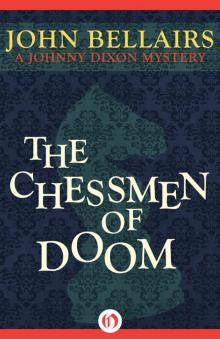 Chessmen of Doom
Chessmen of Doom Secret of the Underground Room
Secret of the Underground Room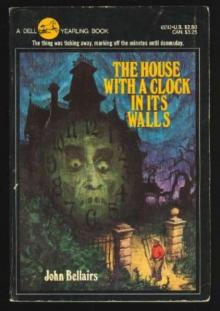 The House With a Clock in Its Walls
The House With a Clock in Its Walls The Vengeance of the Witch-Finder
The Vengeance of the Witch-Finder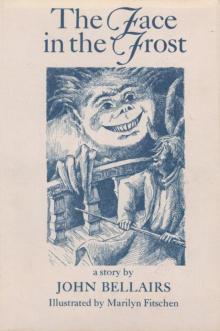 The Face in the Frost
The Face in the Frost Revenge of the Wizard's Ghost
Revenge of the Wizard's Ghost Spell of the Sorcerer's Skull
Spell of the Sorcerer's Skull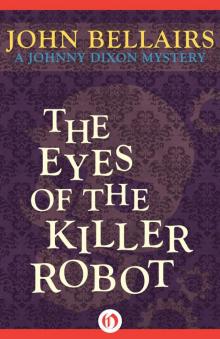 Eyes of the Killer Robot
Eyes of the Killer Robot Mummy, the Will, and the Crypt
Mummy, the Will, and the Crypt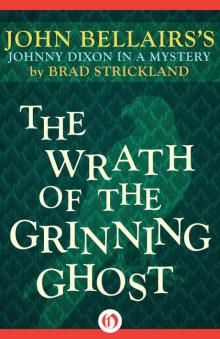 Wrath of the Grinning Ghost
Wrath of the Grinning Ghost The Mansion in the Mist
The Mansion in the Mist The Doom of the Haunted Opera
The Doom of the Haunted Opera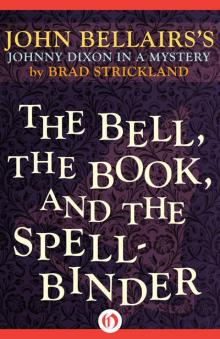 The Bell, the Book, and the Spellbinder
The Bell, the Book, and the Spellbinder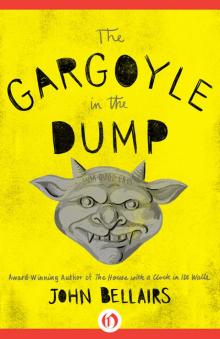 The Gargoyle in the Dump
The Gargoyle in the Dump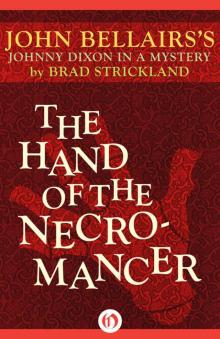 The Hand of the Necromancer
The Hand of the Necromancer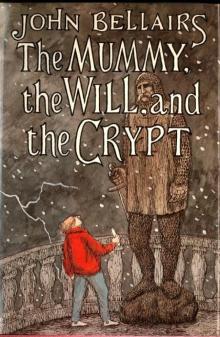 The Mummy, the Will, and the Crypt
The Mummy, the Will, and the Crypt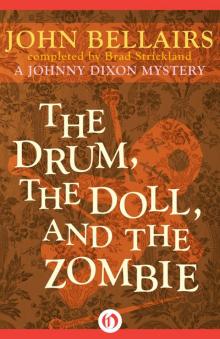 Drum, the Doll, and the Zombie
Drum, the Doll, and the Zombie The Specter from the Magician's Museum
The Specter from the Magician's Museum The Letter, the Witch, and the Ring
The Letter, the Witch, and the Ring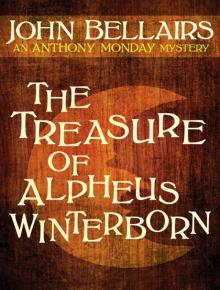 The Treasure of Alpheus Winterborn
The Treasure of Alpheus Winterborn The Dark Secret of Weatherend
The Dark Secret of Weatherend The Figure in the Shadows
The Figure in the Shadows